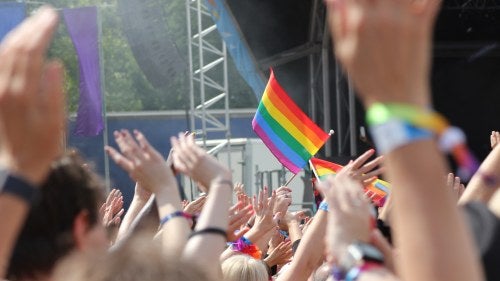Municipal Activism: How Cities Stand Up for LGBTQ+ Rights

Around the world, cities continue to protect the basic human rights of vulnerable populations in the face of fierce opposition from national governments.
Cities around the world have long been bastions of liberal democracy and human rights and have practiced municipal activism for centuries within right-wing national contexts. And in recent years, cities have used their growing clout to address pressing global issues such as LGBTQ+ rights. Three global cities—Warsaw, Bangkok, and Tel Aviv—are considered among the most gay-friendly in the world and yet exist within national contexts with varying degrees of hostility towards the LGBTQ+ community. An analysis of the actions taken by these three cities to protect their LGBTQ+ residents and visitors reveal how cities around the world can support vulnerable populations, a burden increasingly falling on them as the world experiences a resurgence of far-right regimes.
Warsaw
Warsaw is a prime example of a liberal city standing in opposition to its right-wing national government on LGBTQ+ rights. Human Rights Watch declared Warsaw Mayor Rafal Trzaskowski an “outspoken LGBT ally” who in 2019 released a plan that outlined how the city could overcome discrimination and promote equality. In response, the ruling national party, Law and Justice, and their anti-LGBTQ+ allies intensified their rhetoric and set up “LGBT-Ideology-Free Zones,” actions that allegedly breach Poland’s EU obligations regarding human rights.
The city continues to be a relative oasis within Poland. In recent years, Warsaw has held an annual pride parade, which is now the largest in Central and Eastern Europe. Mayor Trzaskowski has also signed a declaration that promised the LGBTQ+ community gathering spaces, a crisis intervention system, and anti-discrimination inclusive education reforms. While Poland continues to backslide on human rights in many ways, Warsaw stands as a model for how cities can protect their LGBTQ+ citizens from the actions of far-right governments.
Bangkok
Bangkok is making progress in a somewhat different context than that of Warsaw, as the city has been on the forefront of pushing the national government—one resistant to progressive change—to make revolutionary advances on LGBTQ+ equality. Bangkok is globally known as a hub for the LGBTQ+ community in Asia, and the Tourism Authority of Thailand advertises the city’s many LGBTQ+ friendly hotels, events, symposiums, and nightlife events. The city also hosted its first pride parade in 16 years in June 2022, an event supported by the city’s newly ratified governor Chardchart Sittiput.
Activists, however, are quick to point out that despite not experiencing the same level of persecution as those in neighboring countries, Thai LGBTQ+ individuals still experience discrimination in labor markets, marriage laws, and social settings, and that LGBTQ+ tourists enjoy far more freedom than locals do. Nevertheless, the country is on its way to becoming the first in Southeast Asia to legalize gay marriage, though activists have criticized the marriage equality bill’s lack of a guarantee of true equality. Despite these criticisms, it is clear that with Bangkok leading the way, Thailand is advancing LGBTQ+ rights, evidence that global cities can pave the way for change at the national level.
Tel Aviv
Tel Aviv, the undisputed queer capital of the Middle East and one of the most gay-friendly cities in the world, has a long history of LGBTQ+ municipal activism in a challenging Israeli national context. The city, whose LGBTQ+ population is estimated at 25 percent, took a leap towards marriage equality and challenged the national government in 2020 by allowing civil couples—LGBTQ+, interfaith, and others—to declare their relationship and enjoy all municipal benefits enjoyed by legally married couples.
Tel Aviv Mayor Ron Huldai explicitly acknowledged the declaration as a challenge to the government. In response, the Shas party, which is a member of the ruling coalition as of December 2022, advised couples that this registration has no legal meaning in state institutions. Israeli LGBTQ+ couples outside of Tel Aviv cannot register their partnership within the state unless married abroad, and all LGBTQ+ Israelis are subject to unequal laws regarding adoption and surrogacy and an unfavorable public sentiment, with only 47% of Israelis saying that homosexuality should be accepted by society, the same percent as Poland.
The Israeli election in November 2022 also changed the national context that Tel Aviv finds itself in. While other right-wing governments have ruled Israel since homosexuality was decriminalized in 1988, none have been as religious, far-right, and socially conservative as the current coalition. Despite Tel Aviv’s activism, it seems unlikely that it will follow Bangkok’s lead and push the nation towards further protections in the near future. It will likely either face a Warsaw-like situation, with Tel Aviv as a bastion of human rights, or will experience a period of national stagnation, with leaders equivocating on policy while intensifying inflammatory rhetoric.
In all three countries—Poland, Thailand, and Israel—their left-leaning, global cities have remained havens for LGBTQ+ people despite the status of their federal rights. In each we can see how cities can remain strongholds for basic human rights that can protect vulnerable populations in the face of often fierce opposition from their national governments.